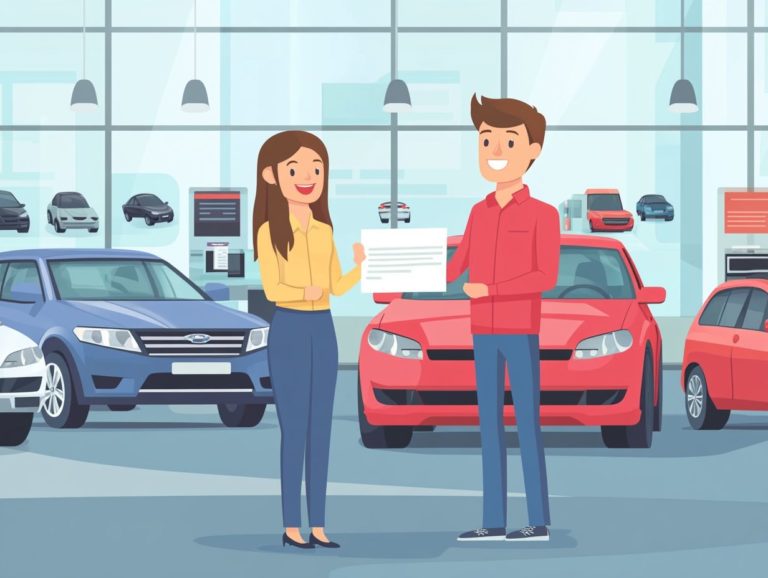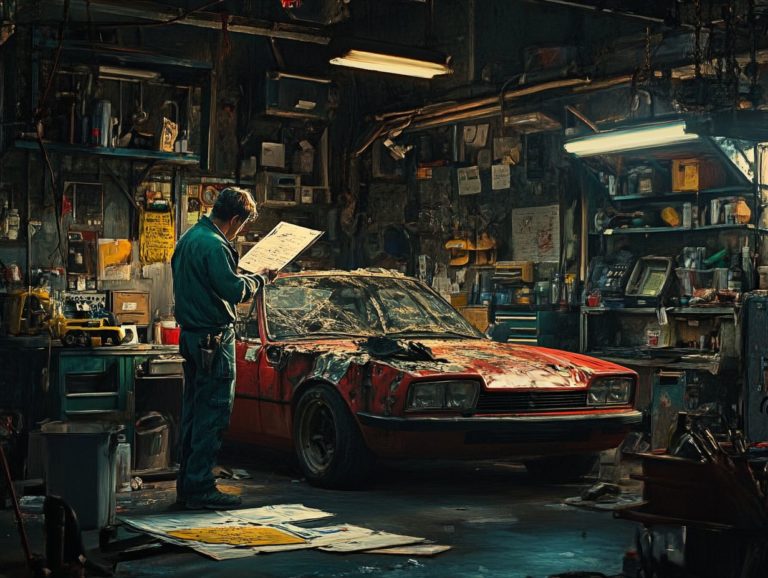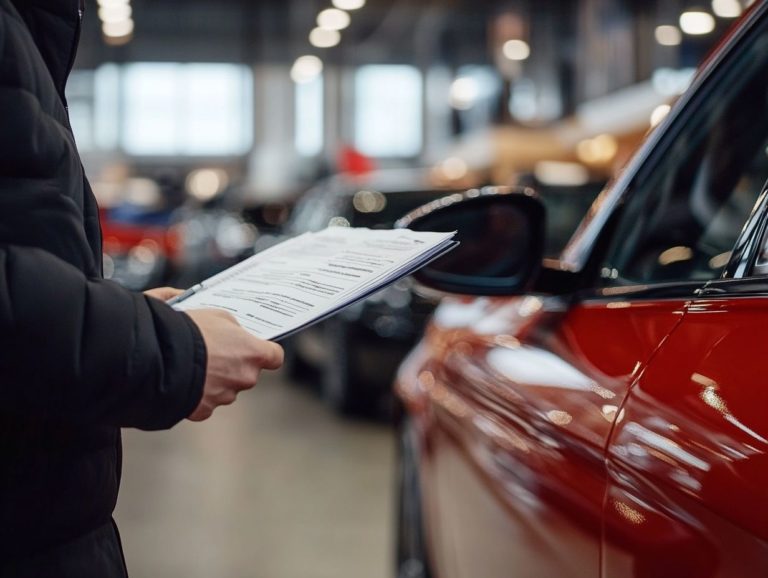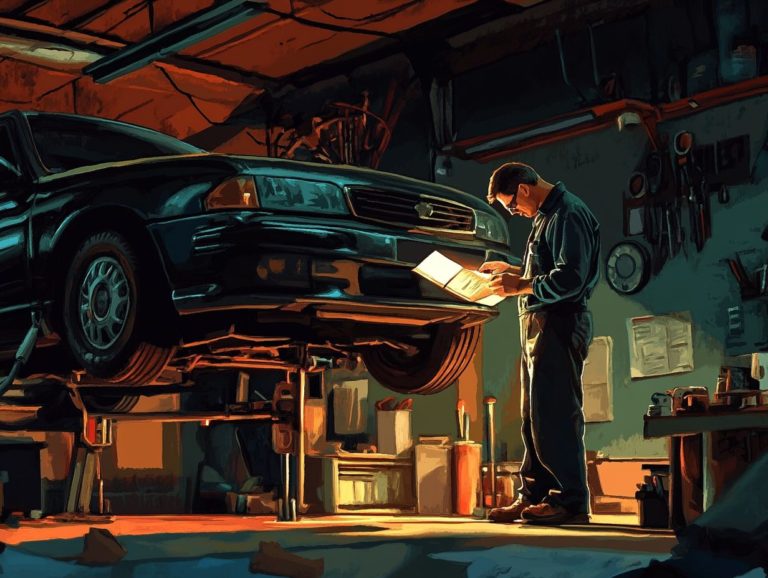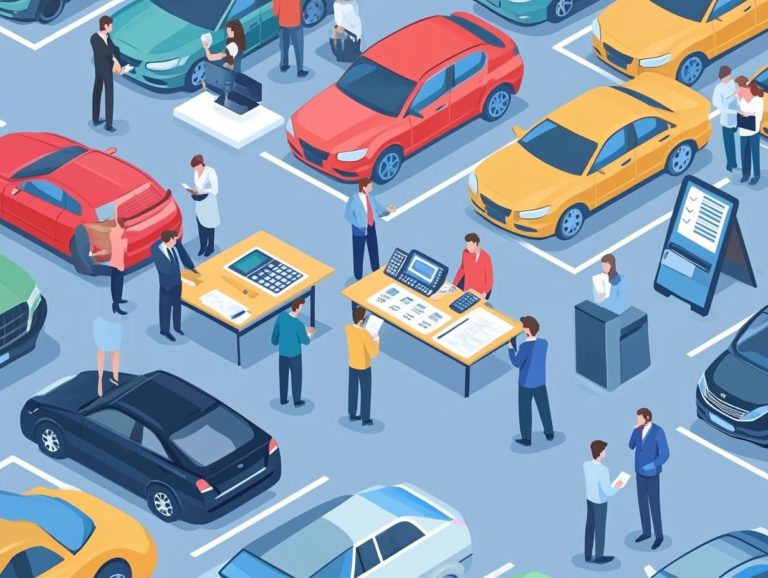Top 7 Mistakes to Avoid When Buying Used Cars
Buying a used car is an exhilarating journey, but it can also feel overwhelming with countless factors to consider.
To help you navigate this path, here are the top seven mistakes you should avoid. These tips can save you time, money, and unnecessary frustration. From inadequate research to overlooking crucial inspections, each misstep can lead to regrets you d rather avoid.
You will find out the benefits of purchasing used cars and pick up some savvy negotiation tips to secure the best deal. Arm yourself with knowledge to make informed decisions and drive away with confidence!
Contents
- Key Takeaways:
- 1. Not Doing Enough Research
- 2. Skipping the Test Drive
- 3. Not Checking the Vehicle History Report
- 4. Not Having a Mechanic Inspect the Car
- 5. Focusing Only on the Price
- 6. Not Negotiating
- 7. Not Taking the Time to Read the Contract
- What Are the Advantages of Buying a Used Car?
- What Are the Most Important Factors to Consider When Buying a Used Car?
- What Are the Most Common Red Flags to Look for in a Used Car?
- How Can a Buyer Avoid Being Scammed When Buying a Used Car?
- What Are the Benefits of Buying from a Dealer vs. a Private Seller?
- What Are the Best Practices for Negotiating the Price of a Used Car?
- What Are the Most Important Things to Look for in the Contract When Buying a Used Car?
- Frequently Asked Questions
Key Takeaways:
- Do thorough research on the car’s make, model, and year.
- Always test drive to check performance and comfort.
- Check the vehicle history report for past issues.

1. Not Doing Enough Research
When you’re in the market for a used car, cutting back on research can lead to expensive blunders. You must dive deep into the used car market, explore financing options, and examine the specific vehicle you re considering to ensure that you re making a well-informed decision.
Utilizing resources like Kelley Blue Book and Edmunds is invaluable, as these platforms offer critical insights into fair market values. This helps you steer clear of overpaying. They provide detailed information on vehicle pricing, historical sales data, and financing alternatives that can save you money over time.
Ignoring the vehicle’s history and current market trends could mean missing out on opportunities or, worse, purchasing a car with hidden issues. Watch out for common pitfalls, such as buying vehicles that have been in accidents or that carry poor reliability ratings. These can lead to unexpected repairs and extra expenses later on.
Taking the time to research thoroughly can make all the difference in securing a vehicle that serves you well without breaking the bank.
2. Skipping the Test Drive
Skipping the test drive when you’re eyeing a used car can lead to serious regrets. It’s crucial to assess the vehicle’s performance, comfort, and handling before making that purchase.
Taking the time to evaluate key aspects like acceleration and braking ensures you grasp how the car behaves in real-world conditions. Watching how it accelerates can reveal the engine’s power and its ability to merge safely onto highways.
Braking performance is also vital for safety; responsive brakes can truly make a difference in emergency situations. And let’s not overlook comfort overall feel matters. A test drive lets you experience the seating, cabin space, and noise levels firsthand.
Ignoring this essential step might land you in a vehicle that feels cramped or unwieldy, which can seriously dampen your long-term satisfaction and driving enjoyment.
3. Not Checking the Vehicle History Report
Neglecting to check the vehicle history report can put you at significant risk. It reveals crucial details about past accidents, title issues, and maintenance records for that used car you re considering.
For anyone aiming to make an informed decision, utilizing services like CARFAX or AutoCheck is absolutely essential. These platforms offer detailed insights that can expose hidden problems, such as previous flood damage or odometer discrepancies, allowing you to weigh your options thoughtfully.
A comprehensive vehicle history report not only helps you avoid costly mistakes but also ensures you’re making a sound investment. In today’s market, where transparency reigns supreme, having access to this information gives you the power to negotiate better deals and ultimately choose a vehicle that aligns with your long-term needs and financial goals.
4. Not Having a Mechanic Inspect the Car

Not having a mechanic inspect a used car before making a purchase can lead to serious oversights regarding critical issues. This inspection is very important for ensuring the car s reliability and safety.
During a thorough used vehicle inspection, a qualified technician evaluates vital components like the engine, brakes, and the system that helps the car’s handling and comfort. They also check crucial safety features such as airbags and seat belts, which are essential for passenger protection.
This proactive step highlights potential problems and keeps you informed about necessary maintenance. Investing in this comprehensive check-up can save you a significant amount in the long run. Addressing these concerns early can prevent costly repairs later and provide you with peace of mind as you navigate the roads.
5. Focusing Only on the Price
While the price is certainly a crucial factor when you’re in the market for a used car, zeroing in solely on the initial cost might cause you to overlook other important aspects, like the total cost of ownership and the vehicle’s resale value.
Insurance rates also vary dramatically depending on the model and year of the vehicle. Understanding this can help you avoid unexpected financial burdens in the future.
Regular maintenance needs also matter, as they are influenced by the car’s age and condition. Include these in your overall budget to ensure your car remains reliable and safe over time.
Consider all these elements to negotiate well. Exploring financing options could provide you with greater flexibility, allowing for better cash flow management or even the chance to invest in upgrades.
By adopting a more holistic approach, you can negotiate a price that not only feels right but also guarantees substantial value in the long run.
6. Not Negotiating
Many buyers fall into the trap of not negotiating the car price. This causes them to miss the chance to secure a better deal or explore advantageous financing options with the used car dealer.
Taking time to grasp the car’s true value empowers you to step into negotiations with confidence, equipped with knowledge that strengthens your position.
Using tools like online valuation guides and vehicle history reports helps uncover potential issues or benefits related to the car, significantly impacting the final price.
When you present your findings during negotiations, it showcases your seriousness and preparation, making it easier to advocate for a better deal.
Being well-informed transforms the negotiation landscape, giving you the power to make decisions that serve your financial interests best.
7. Not Taking the Time to Read the Contract
Overlooking the details in your financing contract can lead to misunderstandings about loans, monthly payments, and insurance options. It s essential to review the contract carefully before signing.
Take the time to examine the interest rates. Even a slight difference can dramatically affect the total cost over time. Also, ensure that payment terms like the frequency and duration of payments are crystal clear to avoid confusion later.
Be vigilant about any hidden fees that might not be immediately apparent, as these can add to your overall expenses and create unexpected financial burdens.
Understanding every part of the contract empowers you to make smart choices, helping you avoid potential pitfalls and ensuring you feel comfortable with your financial commitments.
What Are the Advantages of Buying a Used Car?

Buying a used car presents a wealth of advantages, from substantial cost savings to a broader selection of models that frequently boast desirable safety features. This makes it a compelling option for savvy buyers like you.
One of the standout benefits is the lower depreciation rate associated with used vehicles. They typically hold their value much better than new cars, which can drop significantly in worth the moment they leave the dealership.
Take, for instance, a one-year-old sedan. It could cost you considerably less while delivering nearly identical performance to its brand-new counterpart. With used cars often coming with appealing price points, you have the luxury of choosing from a wider array of vehicles within your budget.
Whether you’re in the market for a reliable compact car or a spacious family-friendly SUV, you’ll be sure to find something that perfectly aligns with your needs.
What Are the Most Important Factors to Consider When Buying a Used Car?
When purchasing a used car, several critical factors need to be considered, including safety features, the vehicle’s history, and the importance of setting a realistic budget. This ensures a sound investment.
Prioritizing safety features is very important not only for the protection of you and your passengers but also for your wallet. Many insurance providers offer discounts for cars equipped with advanced safety technology, which can significantly lower your insurance costs. Features such as anti-lock brakes, airbags, and stability control keep you safer and enhance the resale value, making the car more appealing to future buyers.
Evaluating the car’s history is just as essential. A vehicle with a clean record typically commands a higher resale price and can save you from potential headaches down the road.
Establishing a proper budget is crucial. It helps you prepare for unexpected repairs and insurance premiums, allowing you to avoid financial strain after the purchase. A well-planned budget offers peace of mind, enabling you to fully enjoy your new vehicle without unnecessary stress.
What Are the Most Common Red Flags to Look for in a Used Car?
Identifying common red flags in the used car market can save you from making costly mistakes. To avoid pitfalls, be sure to learn about the most common car buying mistakes and watch for unusual wear and tear or discrepancies in the vehicle history report.
Stay particularly vigilant for signs like inconsistent mileage readings, which might indicate tampering, and visible rust on the chassis that could point to more serious structural issues.
Examining service records for irregularities or gaps is essential, as these can hint at neglect or underlying problems.
To dig deeper, it’s wise to request a comprehensive vehicle history report, which is a document that shows the car’s past ownership and accidents, and verify its claims through a certified mechanic. A thorough inspection can reveal hidden issues, empowering you to make informed decisions before you finalize any purchase.
How Can a Buyer Avoid Being Scammed When Buying a Used Car?
Act now to avoid scams when buying a used car. You should embark on thorough research, verify vehicle history reports, and exercise caution when dealing with unfamiliar dealerships.
Seek referrals from friends or family who have recently bought vehicles. This can lead you to trustworthy sources and positive experiences.
Use reputable vehicle history services to provide you with crucial insights into the car s past and help you uncover any hidden issues. Stay alert for scams like odometer rollbacks and misleading advertising.
You can take these steps to significantly minimize the risk of falling victim to dishonest practices while you search for your ideal vehicle.
What Are the Benefits of Buying from a Dealer vs. a Private Seller?

Purchasing a used car from a dealer offers many advantages. These include financing options, warranties, and the peace of mind that comes with thorough vehicle inspections. This makes dealerships a more secure choice than private sellers.
Dealers provide post-sale support, ensuring that any concerns you have can be addressed quickly and professionally. This dedication to customer satisfaction builds trust and enhances your overall buying experience.
Private sellers often lack the transparency that dealerships provide. You could encounter hidden issues or unclear maintenance histories. This uncertainty may lead to stress and unexpected repair costs later, making it clear that choosing a dealership is often the smarter, risk-averse option.
What Are the Best Practices for Negotiating the Price of a Used Car?
Negotiating is crucial when buying a used car. Knowing the vehicle’s value and market conditions can greatly influence the final price you pay.
Before starting negotiations, conduct thorough research on the car s fair market value. Resources like Kelley Blue Book and Edmunds can offer valuable insights, helping you assess a vehicle s worth based on its make, model, year, and condition.
Establishing a clear budget is equally important. This allows you to define your maximum spending limit without risking your financial stability.
Being prepared for counter-offers enhances your negotiating experience. This flexibility helps you secure the best deal possible.
Adopting this strategic approach not only increases your chances of making a successful purchase but also makes the buying experience more confident and enjoyable.
What Are the Most Important Things to Look for in the Contract When Buying a Used Car?
Reviewing a contract for a used car purchase requires attention to details like financing options, monthly payments, and insurance requirements. This ensures everything is clear and protects your investment.
Besides these basics, closely examine the Annual Percentage Rate (APR) in the contract. This figure determines the total cost of borrowing and affects your monthly payments.
Pay attention to the payment terms, including the duration and structure of payments. Ensure they align with your personal budget and expectations. It s also wise to watch for hidden fees, like administrative costs or penalties for early repayment, which could lead to unwelcome surprises.
Understanding these elements will pave the way for a smoother purchasing experience and protect you from unforeseen financial burdens.
Frequently Asked Questions
What are the top 7 mistakes to avoid when buying used cars?
1. Research the make and model of the car: Do your homework to find a used car that meets your needs and budget.
2. Don t skip the test drive: A test drive is essential to get a feel for the car and ensure everything works properly.
3. Get a vehicle history report: Always ask for a report to confirm the car’s accident history and any outstanding issues.
4. Watch for hidden fees and charges: Read the fine print and inquire about any additional fees before finalizing your purchase.
5. Have the car inspected by a mechanic: A professional inspection can reveal potential issues prior to purchase.
6. Don t hesitate to negotiate the price: Be assertive; you may secure a better deal through negotiation.
7. Take your time: Don t rush into a purchase. Carefully consider all factors before making your decision.

